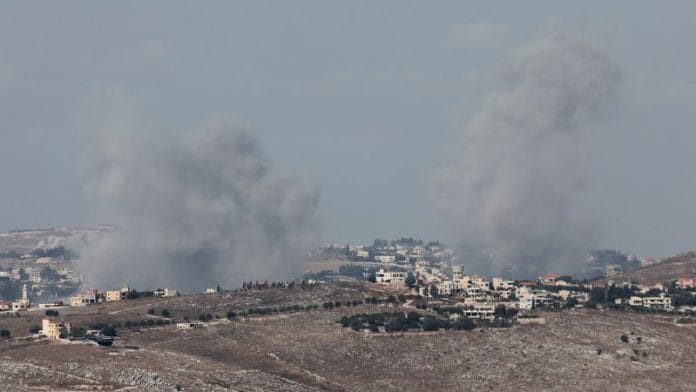The cycle of revenge in West Asia triggered by Hamas on 7 October 2023 is expanding in scope and intensity. It now also includes Iran and its proxies in Lebanon, Yemen, Iraq, and Syria, which are exchanging violent blows with Israel. The United States, the prime political and strategic supporter of Israel, has deployed maritime military assets that have reinforced the latter’s defence protection. It has also carried out several air strikes against Houthis in Yemen.
The US recently announced the deployment of the Terminal High Altitude Area Defense (THAAD) system that will be operated by nearly 100 troops. The THAAD is a mobile platform designed to intercept short-, medium-, and intermediate-range missiles in their terminal phase. The deployment was presumably connected to Israel planning its reaction to Iran’s missiles, rockets, and drone strikes against Israel that were carried out nearly a month ago. What this signifies is a deepening of the US involvement in a confrontation that has morphed into an Israel-Iran conflict. It increases the possibility of the US taking direct action against Iran. However, Iran would not want an escalation, which involves the use of accurate and lethal armaments that it cannot counter.
Iran’s preference for the methodology of inflicting violence is based on small, lethally armed groups that could cause damage beyond their size. The methodology is best represented by the actions of suicide bombers and improvised explosive devices. Such strategies have been described as weapons of the weak against the strong. For the recipient of violence, ‘terrorism’ is the descriptor. Paradoxically, when violence is inflicted and civilians are impacted by bombs, missiles, and rockets from conventional platforms, ‘collateral damage’ presumably becomes the hypocritically accepted descriptor for the perpetrator even when humanitarian laws are cast aside.
Israel continues its blatant violation of humanitarian laws/norms in Gaza, West Bank, and Lebanon amid the inability of the international community represented by the United Nations to curb the pace and scope of the war in terms of civilians killed and wounded. In addition, most of the population in Gaza has been displaced and become refugees who have had to move many times constantly seeking shelter. They have also been facing chronic starvation and lack any medical support, with Israel blocking aid convoys.
Also read: Lebanon gadget attacks aren’t just a foreign problem—India is at risk too
Grounds for terrorism
Whichever way this cycle of revenge subsides, what is certain is that it could breed several generations of Palestinians and other ethnicities that would remember Israel’s infliction of violence. Moreover, with the images of destruction, death, and wounding of innocents, including children, populating the screens of a vastly connected world, the possibility of terrorism making a major comeback in the future has become a distinct possibility. Notably, the battlefronts of the emotions generated by revenge will be drawn along the lines of religion, especially between Islam and Christianity clubbed with Judaism. Such a clubbing is conceivable due to the perceived Western support led by the US for Israel’s actions.
Though the breeding ground for terrorism may have been created, it still requires some organisational structure and a certain degree of State support to pose any major threat. As things stand, unless there is a change of tack in dealing with Iran, the conflict is likely to continue with its current anti-Israeli nature. Taliban-ruled Afghanistan is also another candidate. It will not be surprising if China and Russia also provide tacit support, as the opening up of US-led anti-Iranian or any other front work to their advantage in the global geopolitical competition.
In terms of leadership, another Osama bin Laden or a number of them could emerge—the perception of the confrontation as a religious war could ignite emotions as no other factor can. There is a possibility of the Arab world being drawn into such a future conflict. Afghanistan, Pakistan, Maldives, Bangladesh and Indonesia could be potential candidates. This is apart from the religious cleavages that exist in many countries in Africa and Central Asia. Areas like Xinjiang, which harbours a sizable population of religiously repressed people, could also be drawn in especially if China is distracted from dealing with problems arising due to its geopolitical tensions.
A question we must ask
India, too, could be a possible candidate for being strung along by the resurgence of global religious wars, having in its sails the winds of emotions steeped in narratives of brutality witnessed on social media and TV. The last time around when the Bin Laden-led Jihad was played out, India, despite having the second-largest Muslim population, had managed to keep itself out of the confrontation. Whatever degree India was impacted was on account of Afghanistan-Pakistan providing shelter and support to terrorists.
There is a high possibility that the next generation of fighters to partake in future religious wars will be much more technologically savvy. Such skill sets could be leveraged by small groups of people to weaponise cyberspace and inflict damage to the big and strong. Cyberspace provides opportunities to find the cheapest pathways to cause unacceptable, disproportionate damage. Economic and transportation systems would be particularly vulnerable.
The question that we should now pose to ourselves is whether any alienated segments of India’s Muslim population can once again stay away from global religious strife if and when it makes its appearance. It is necessary to ask this question, for the context of India’s domestic politics has transformed and the constitutional safeguards of an inclusive and secular outlook eroded by the emergence of a pronounced and unfortunately popular Hindu majoritarian slant.
Lt Gen (Dr) Prakash Menon (retd) is Director, Strategic Studies Programme, Takshashila Institution; former military adviser, National Security Council Secretariat. He tweets @prakashmenon51. Views are personal.
(Edited by Humra Laeeq)






